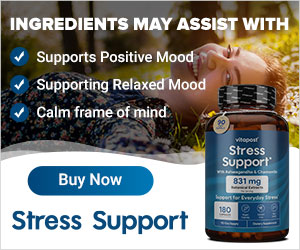Remember the last time you were nervous, restless, irritable or just simply anxious, but felt much better almost immediately after eating some dark chocolate or nuts? That’s partly because of the magnesium contained in these foods. Magnesium is an important element to be taken into account as far as anxiety is concerned. Since magnesium helps nourish your nervous system, it goes without saying that magnesium deficiency can trigger symptoms of anxiety. Magnesium also functions to protect your heart and its arteries, which also play a crucial role in controlling anxiety attacks. Incidentally, most magnesium-rich foods also contain a significant amount of calcium – another element your body needs to keep anxiety at bay. Even I have handled the best supplements for anxiety in this post, I didn’t include magnesium even it definitely is one of the most important supplements for anxiety. I wanted to dedicate own post to this very important mineral
The best holistic way to KILL anxiety!
Effect of magnesium
Magnesium has a soothing impact on your muscles and a calming effect on your mind. Simply adding magnesium-rich foods to your diet can go a long way in soothing your nerves and relieving you of anxiety symptoms. By relaxing the nerves, magnesium helps you sleep better, especially if taken just before going to bed at night. Besides consuming magnesium orally, you can also absorb it through your skin. Or the next time you’re preparing take to take a nice warm bath, just add some Epsom salt to the water and feel your body soak in the tranquilizing effects of magnesium. As a natural treatment, magnesium’s positive impact as an anxiety reliever is not only without any harmful side effects, but also has no addictive properties.
How magnesium works
With magnesium deficiency contributing to anxiety in many people, it’s important to compensate for the loss of magnesium in modern-day processed foods. Actually, magnesium deficiency, which plays a significant role in hundreds (actually there are more than 300) of chemical reactions in your body, can lead to many mental health problems, of which anxiety is a common one.
One important chemical reaction involving magnesium relates to stress, as the body tends to consume a lot of magnesium during times of stress. This naturally leads to magnesium deficiency, triggering anxiety. Now, since anxiety causes the body to use up more magnesium, leading to shortage of the element, you need more magnesium to make up for the loss. It’s effectively, thus, a vicious cycle, with anxiety causing a spike in magnesium consumption, and thus leading to magnesium deficiency and even more anxiety.
Another positive way in which magnesium helps is by negating some of the toxic effect of calcium in the body. Magnesium balances out the calcium, thus averting toxicity and damage to the brain. Also, mental health has a direct correlation with physical health. So if your body is getting enough magnesium, all the chemical reactions that it’s involved in work properly. This helps the body function smoothly, thereby having a positive effect on your mind.
Because magnesium is a precursor for neurotransmitters such as serotonin, it’s one of the most important minerals to take when treating anxiety. If you are on drugs — especially on prescription drugs — those easily deplete your magnesium stores. Therefore getting enough magnesium is even more important for people with anxiety and who are treated with prescription drugs.
Sources of magnesium
With magnesium a natural ingredient in many foods, increasing the intake of such foods will help boost your magnesium levels. As mentioned earlier, nuts and dark chocolate are among the foods that are rich in magnesium. Dark leafy greens are an excellent source of magnesium, as are especially some seeds, like pumpkin seeds and sunflower seeds. Fish can also help increase your magnesium intake. Remember to use also unrefined sea salt instead of table salt to secure your magnesium intake. But with food processing taking magnesium away from most food items, magnesium supplements are increasingly proving more effective, and popular, in anxiety alleviation. This doesn’t mean that you should continue eating junk and try to compensate that with taking magnesium supplement. Eliminating all processed food along with sugar and harmful hydrogenated vegetable oils should in every case be the first action when fighting against anxiety. However, magnesium supplements are definitely needed if your magnesium deficiency is quite severe. Taking magnesium supplements regularly, as prescribed by your doctor or naturopath, can have a significant positive effect when it comes to anxiety relief. But mind you, like all other natural therapies, magnesium works best in conjunction with other treatments and can’t really cure anxiety by itself.
Side effects of magnesium
Magnesium is generally considered safe if taken orally or injected into the blood, under a doctor’s supervision. Proper dosage, starting with a low one, ensures that it works safely, without side effects. Some of the common side effects of magnesium (especially if you take magnesium oxide, which you actually shouldn’t take) include stomach problems such as diarrhea, nausea and vomiting. But if taken in excessive dosages, magnesium can also lead to lowering of the blood pressure, breathing problems, confusion and irregular heartbeat. In extreme cases, this can even cause a patient to go into coma, or die. Magnesium can thus prove fatal if not taken with due precautions.
Which form of magnesium is best for anxiety
But which form of magnesium is best for anxiety? Since it’s difficult to get enough magnesium from natural sources, and as we know how magnesium helps with anxiety, taking magnesium supplements is desirable. Your body handles different types of magnesium in a very different way: some it absorbs really well and some it can hardly absorb, causing bad side effects like diarrhea, stomach pain, vomiting and nausea, the side effects we talked about in the previous chapter.
When it comes to magnesium supplements, you have to pay for quality, but believe me, it’s worth it. Why pay for something that doesn’t correct your magnesium deficiency (and thus have a positive impact on your anxiety) but gives you upset stomach instead? Usually the cheapest magnesium supplements contain for example magnesium oxide, and that cannot be recommended just because of those side effects (like loose stools, unless you try to get rid of constipation, in which case you can give a try to milk of magnesia, just don’t overdose it), and your body cannot absorb magnesium oxide very well. Magnesium oxide is not chelated but bound to an organic acid or a fatty acid.
So, what is the best form of magnesium for anxiety? The answer is short: magnesium glycinate. It is chelated, and your body can absorb it really well compared to for example magnesium oxide which actually contains only 60% magnesium. There are other forms of magnesium as well. If you cannot get glycinate, magnesium taurate is another brilliant option when thinking of treating anxiety with magnesium. Magnesium taurate is a combination of magnesium and taurine (you might know taurine from energy drinks… stay away from those! They will just worsen your anxiety). Magnesium and taurine is a powerful combo, they calm your body and mind, thus being an excellent option for people with anxiety.
Precautions for use
If taken in proper doses, magnesium is mostly safe for pregnant and breast-feeding women. But the moment the dosage increases significantly, it becomes unsafe. Elderly people as well as those suffering from diabetes, heart blockage, bleeding disorders and alcoholism usually suffer higher risk of magnesium deficiency. Magnesium absorption tends to go down in such people. Certain diseases also affect the absorption of this element. So you may see patients of stomach infections, inflammation in the bowel or immune diseases unable to absorb magnesium well. Patients with kidney problems are advised not to take magnesium, as are people on antibiotics, which are seen to interfere with magnesium action. Other medications that interact with magnesium include bisphosphonates, calcium channel blockers, muscle relaxants and water pills. So even magnesium is in general well-tolerated and harmless even in higher doses for people without health issues, always talk to your doctor or naturopath first before taking magnesium.
Conclusion
Modern lifestyle and diet have adversely impacted the functioning of the human body, causing many diseases and conditions to become common, globally. Anxiety is one such problem, which is mainly related to our lifestyle and foods. Unfortunately, while changing lifestyle and improving diet patterns are the best ways of tackling anxiety, it doesn’t usually work on its own. That’s because by the time we become aware of the condition, it has become so severe that medications, drugs and supplements are additionally required for its treatment. Magnesium supplements are thus becoming an important part of anxiety treatment and are found to be quite beneficial, if taken properly, preferably under the supervision of a doctor.






